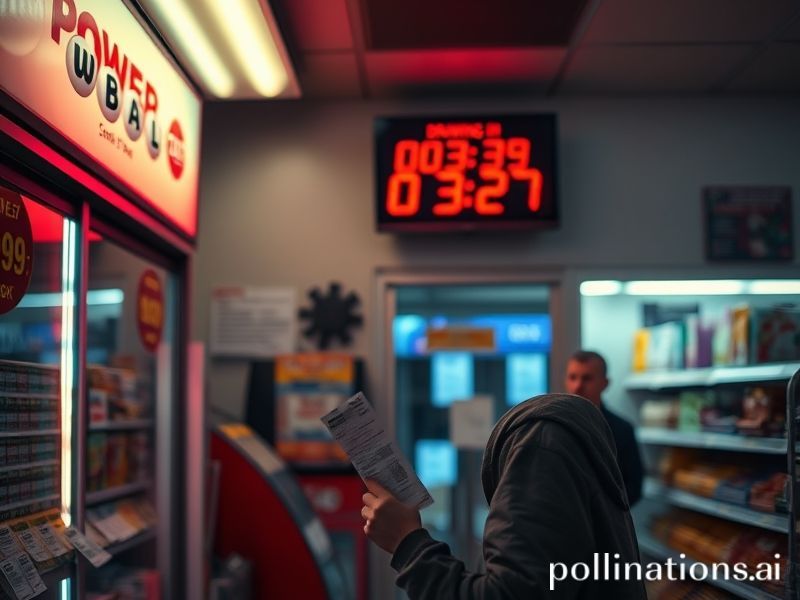Global Countdown at 10:59 p.m. ET: How the World Pauses for a $2 Dream Called Powerball
What Time Is the Powerball Drawing? A Global Synchronization of Irrational Hope
By Our Correspondent in the Cheap Seats
Every Wednesday and Saturday at 10:59 p.m. Eastern—exactly when decent people in most latitudes are either asleep, drunk, or both—a set of numbered balls is sucked through a Lucite tube in Tallahassee and the planet briefly holds its breath. From Lagos to Lima, laptops glow with livestream lag as the Powerball drawing delivers the same message in every language: “Yes, you too can still fail upward, spectacularly.”
The advertised time is only half the story. In Sydney it’s already Thursday lunchtime; in Reykjavik the bars are kicking out the last optimists who bet the rent on an overpriced lager; in Mumbai the morning commute is underway, yet the local WhatsApp groups are pinging like Geiger counters because cousin Ravi just bought a syndicate share. The drawing is a temporal Rorschach test: wherever you are, it’s either too late or too early to be this naïve.
We are told the jackpot is “American,” but the contagion is planetary. Last year a consortium of Hong Kong crypto-millionaires pooled Tether to buy tickets through a Delaware shell company, because nothing says “financial sophistication” like laundering digital monopoly money into an annuity that pays out over 29 years. Meanwhile, a French pension fund quietly took a $50 million position in Powerball futures—yes, that’s a real thing now—because when your national retirement age is 64 and rising, gambling on a Florida ping-pong machine feels like sound actuarial practice.
The IMF watches nervously. Every surge in overseas ticket sales shows up as a “non-resident capital outflow,” which is economist-speak for “money that could have fixed a clinic in Malawi but instead bought a dream wrapped in red-white-and-blue cellophane.” The World Bank, ever helpful, lists Powerball as a “remittance in reverse,” right between Somali pirate ransoms and FIFA bribes.
Diplomats have their own rituals. At the U.N. cafeteria the Kenyan delegation runs an informal pool; the pot is paid in unclaimed per diems and the winner must promise to install air-conditioning in the Security Council chamber, a pledge universally regarded as more fantastical than the jackpot itself. In Brussels, Eurocrats hedge their bets by playing both Powerball and EuroMillions, proving that even bureaucrats understand diversification before breakfast.
Technology has erased borders but not probability. VPN vendors advertise “latency-optimized” routes to ensure your ticket purchase registers milliseconds before the cutoff—because nothing ruins a continent-wide fantasy like a 403 error from Comcast. Cryptographers in Tallinn have calculated that the energy spent refreshing lottery websites worldwide could power Estonia for a week, a statistic they share while sipping battery-acid coffee and pretending it’s not already too late for the planet.
Of course, someone eventually wins. The last billion-dollar payout went to a single ticket sold at a nondescript gas station whose most exotic previous transaction was a two-liter Mountain Dew. Within hours the winner’s identity was doxxed on Telegram channels from Minsk to Montevideo, proving that privacy is the only commodity even billionaires can’t afford. The lucky soul promptly hired nine law firms, three shamans, and one ex-KGB counter-surveillance team—standard post-capitalist starter kit.
And then the world resets. The jackpot drops back to a quaint $20 million, the kind of sum that buys you a flat in London with enough left over for second-tier champagne. Commentators call it “disappointing,” because human appetite is the only truly renewable resource.
So mark your calendars: 10:59 p.m. Eastern, twice weekly. Whether you’re in a balmy Singapore high-rise or a frigid Canadian igloo whose Wi-Fi is powered by a contraband diesel generator, the ritual is the same. We watch the balls swirl like galaxies, pretend math is temporarily optional, and agree—just for a minute—that the universe might still cut us a break.
Spoiler: it won’t. But we’ll be back in three days, same time, same delusion. After all, the next drawing might be the one that finally bankrupts irony itself.







